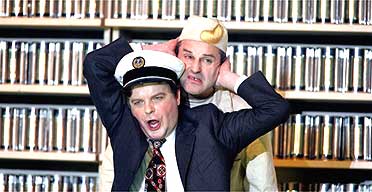
Welsh National Opera's first show at the Millennium Centre may have been a revival of La Traviata, generally a box-office banker even when there isn't a new theatre to show off as well, but the company then wasted no time in demonstrating the seriousness of its artistic intent with the premiere of a production of Wozzeck directed by Richard Jones and designed by Paul Steinberg.
Alban Berg's masterpiece, based upon Georg Büchner's fragmentary drama, is never a crowd-puller and not likely to leave an audience feeling any better about the human condition. But this staging was greeted with enormous enthusiasm at the final curtain, partly because everyone is just so pleased that WNO finally has a new home, but also because every particle of this withering music drama communicated with maximum vividness in this auditorium. Balance between stage and pit seems effortlessly right, and the orchestral sound itself, apart from a few moments when the woodwind tone became curiously boxy, is supple, warm and beautifully detailed.
It helps that the score is conducted with such fabulous intensity and intelligence by Vladimir Jurowski.
Jones's production takes its cue from a line in the libretto when the doctor, one of Wozzeck's persecutors, instructs him to continue his diet of beans. The opera is shifted from the 19th-century to the present, and instead of being a private soldier, Wozzeck works in a canning factory, where one of the perks job seems to be eating as many tins of baked beans as he likes.
Through much of the opera he wears a spoon on a chain around his neck, ready to consume the next snack, throwing the empties into a skip that gets ever larger as the tragedy deepens, until rather than drowning in a lake as Berg and Büchner's originals have it, he climbs to the top of this mountain of cans and is engulfed.
In this world, everyone is mad in their own way; in the programme Jones describes the score wonderfully as a "coral reef of hallucination". Wozzeck (a performance of huge security and vulnerability from Christopher Purves) may be the only one who is clinically certifiable, but his line manager the captain (the excellent Peter Hoare), is obsessed with his own status, while the doctor (Clive Bayley) is the epitome of a ruthless scientist. Even Gun-Brit Barkmin's Marie seems obsessed with triviality, inhabiting a world of TV trash and the most superficial glamour, so that her seduction by Peter Svensson's American-style executive Drum Major seems even more tawdry than usual.
It's an approach that comes close to caricature at times, and so occasionally loses some of the work's humanity. Wozzeck should be a tragedy of the oppressed, a morality tale of what happens to relationships and the human spirit when grinding poverty and exploitation overwhelm a life and that has to be inferred rather than experienced in much of Jones's staging. He does, though, cut away all the firm emotional ground in the final scene after the deaths of Wozzeck and Marie. A children's party is taking place at the bean factory, and the children are playing pass the parcel. Marie's child ends up with the prize, which turns out to be a spoon on a chain which he places around his neck.
The misery has been passed to the next generation; not the most obvious message with which to initiate a splendid new performing space, but a pretty unforgettable one.
· Further performances February 25 and March 12 (Box office: 08700 40 2000), and touring.

